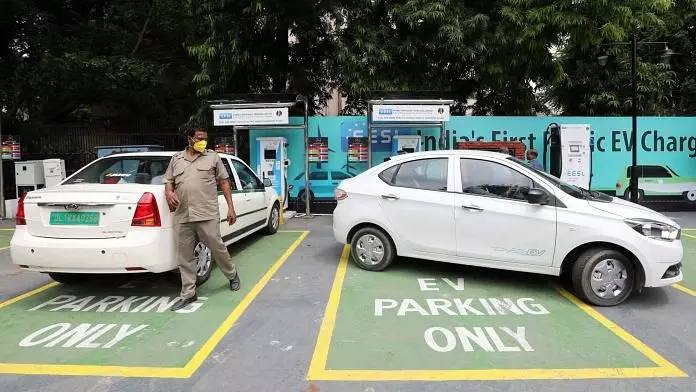EVs May See Production Halt from July Due to Chinese REE Export Curbs
Shipments of critical rare Earth elements-based components from China have slowed significantly due to newly imposed export licensing requirements

Electric vehicle makers anticipate potential production disruptions from July. (Representational image: Bloomberg)
Chennai: Due to stringent controls, China has not approved the export licence applications submitted by Indian firms for rare Earth elements in June. Electric vehicle makers anticipate potential production disruptions from July.
Shipments of critical rare Earth elements-based components from China have slowed significantly due to newly imposed export licensing requirements. On April 4, 2025, China introduced stringent export controls on seven rare earth elements (REEs), namely Neodymium, Dysprosium, Terbium, Samarium, Gadolinium, Praseodymium and Cerium, commonly used in the production of high-performance magnets critical to the automotive, defence, clean energy, aerospace and electronics industries. Under the new regulations, Chinese exporters must secure special licenses, end-user certificates, and government-to-government approvals to ship these materials abroad.
This verification process has led to considerable delays. As of June 2025, none of the export license applications submitted by Indian firms for REEs have been approved by China, despite sustained diplomatic efforts, according to Care Ratings.
With inventories depleting, major OEMs warn of potential production disruptions starting July 2025. Rising input costs and supply uncertainty could slow EV adoption and expose the auto sector to broader geopolitical risks. India’s import dependency on China for rare earth permanent magnet remained as high as 90 per cent during FY24 and FY25. This extreme dependence highlights the urgent need for strategic investment in refining infrastructure to achieve technological self-reliance.
Indian industry has been actively advocating diplomatic engagement with China to expedite pending approvals, streamline licensing procedures and ensure the uninterrupted flow of critical components. The government is considering commercialising magnet manufacturing technologies currently held by select public sector entities as an immediate contingency measure.
Simultaneously, efforts are underway to formalise alternative supply chains for REEs, with potential sourcing from countries such as Vietnam, Australia and the US. However, these alternative sources lack the processing capacity to meet global demand soon.
To build long-term resilience, India must accelerate the development of a domestic REE supply chain. This includes exploring REE-rich regions, incentivising private sector participation in mining and processing, investing in R&D for alternative technologies, and forging global partnerships.
Shipments of critical rare Earth elements-based components from China have slowed significantly due to newly imposed export licensing requirements. On April 4, 2025, China introduced stringent export controls on seven rare earth elements (REEs), namely Neodymium, Dysprosium, Terbium, Samarium, Gadolinium, Praseodymium and Cerium, commonly used in the production of high-performance magnets critical to the automotive, defence, clean energy, aerospace and electronics industries. Under the new regulations, Chinese exporters must secure special licenses, end-user certificates, and government-to-government approvals to ship these materials abroad.
This verification process has led to considerable delays. As of June 2025, none of the export license applications submitted by Indian firms for REEs have been approved by China, despite sustained diplomatic efforts, according to Care Ratings.
With inventories depleting, major OEMs warn of potential production disruptions starting July 2025. Rising input costs and supply uncertainty could slow EV adoption and expose the auto sector to broader geopolitical risks. India’s import dependency on China for rare earth permanent magnet remained as high as 90 per cent during FY24 and FY25. This extreme dependence highlights the urgent need for strategic investment in refining infrastructure to achieve technological self-reliance.
Indian industry has been actively advocating diplomatic engagement with China to expedite pending approvals, streamline licensing procedures and ensure the uninterrupted flow of critical components. The government is considering commercialising magnet manufacturing technologies currently held by select public sector entities as an immediate contingency measure.
Simultaneously, efforts are underway to formalise alternative supply chains for REEs, with potential sourcing from countries such as Vietnam, Australia and the US. However, these alternative sources lack the processing capacity to meet global demand soon.
To build long-term resilience, India must accelerate the development of a domestic REE supply chain. This includes exploring REE-rich regions, incentivising private sector participation in mining and processing, investing in R&D for alternative technologies, and forging global partnerships.
( Source : Deccan Chronicle )
Next Story

